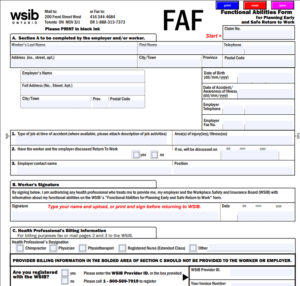Promoting employment opportunities among the disabled community is not only a matter of social responsibility but also a strategic move towards a more inclusive and prosperous society.
Disabled individuals possess a vast array of skills, talents, and unique perspectives that, when given the opportunity, can contribute significantly to the workforce. By embracing and supporting their inclusion in employment, we not only empower individuals with disabilities to achieve financial independence and improve their quality of life but also unlock the immense economic and social benefits that stem from a diverse and inclusive workforce.
It is time to challenge misconceptions, break down barriers, and recognize the immense potential of disabled individuals as valuable contributors to our workplaces and communities.
Benefits of Employment for Disabled Individuals: Independence and Quality of Life
Employment can bring numerous benefits to individuals with disabilities.
Employment provides disabled individuals with a source of income, allowing them to become financially independent. It helps reduce reliance on government and other benefits and promotes self-sufficiency. Having a job can enhance the overall quality of life for disabled individuals.
It gives them a sense of purpose, self-worth, and accomplishment. Meaningful employment can contribute to greater life satisfaction and happiness. Employment offers opportunities for disabled individuals to interact with colleagues, clients, and customers. It facilitates social integration and fosters the development of social networks.
Through work, people with disabilities can build relationships, form friendships, and be part of a supportive community.
Developing Skills and Enhancing Well-being Through Employment
Employment provides an avenue for disabled individuals to develop and enhance their skills.
They can acquire new knowledge, improve existing abilities, and gain experience in their chosen field. This can lead to personal growth, increased self-confidence, and expanded career prospects. Meaningful work can positively impact the physical and mental well-being of disabled individuals.
It provides structure to their daily lives, reduces feelings of isolation, and promotes a sense of belonging. It can also improve self-esteem and contribute to better overall health outcomes. By actively including disabled individuals in the workforce, society can promote overarching concepts of equality and diversity.
Employment opportunities for people with disabilities help break down barriers, challenge stereotypes, and create a more inclusive society, and highlights the valuable contributions that disabled individuals can make in the workplace.
Economic Benefits of Employing Disabled Individuals
The employment of disabled individuals ultimately brings economic benefits to society as a whole.
By tapping into the diverse talents and skills of disabled workers, businesses can increase productivity, foster innovation, and enhance their competitive edge. Employed individuals with disabilities serve as role models and a source of inspiration for others facing similar challenges.
Their success stories can motivate and empower other disabled individuals to pursue their career aspirations and overcome obstacles. It is important to note that these benefits can vary depending on factors such as the nature of the disability, the support systems in place, and the accessibility of workplaces.
Creating inclusive environments and implementing reasonable accommodations are crucial to maximizing the advantages of employment for disabled individuals.
Advantages for Employers: Diversity, Productivity, and Positive Workplace Culture
Employers can in fact experience several advantages when hiring disabled workers.
Disabled individuals often possess unique skills and perspectives that can contribute to a diverse and inclusive workforce. They bring a range of talents, abilities, and problem-solving approaches that can enhance creativity and innovation within the organization. Studies have shown that disabled employees are often highly motivated and committed to their work. They often bring a strong work ethic, determination, and resilience to their roles.
This dedication can result in increased productivity and efficiency within the workplace.
Hiring disabled workers can lead to higher levels of employee loyalty and retention. Disabled individuals may have faced more significant barriers in securing employment, making them more likely to be committed to their jobs and demonstrate long-term loyalty to the organization. Retaining experienced employees can reduce recruitment and training costs. An inclusive work environment that embraces diversity, including disabled individuals, fosters a positive workplace culture. It promotes teamwork, respect, and empathy among employees.
When disabled workers feel valued and supported, it can have a positive impact on overall employee morale and satisfaction.
Enhancing Reputation and Accessing Hidden Talents
Employers that actively support and hire disabled individuals also enhance their reputation as socially responsible and inclusive organizations.
This can attract positive attention from customers, clients, investment, and the broader community. It may also open up new business opportunities, as many consumers prefer to support companies that prioritize diversity and inclusivity. By considering disabled candidates, employers gain access to a significant pool of skilled workers who may be overlooked by other organizations.
This expanded talent pool allows employers to tap into a broader range of expertise and capabilities, potentially uncovering hidden talents and benefiting from diverse perspectives.
Legal Requirements and Incentives for Hiring Disabled Workers
In Canada, there are legal requirements and regulations aimed at promoting equal employment opportunities for disabled individuals.
By hiring disabled workers, employers can ensure compliance with these laws and demonstrate their commitment to diversity and inclusivity. Hiring disabled workers can result in cost savings for employers. Governments and organizations often provide financial incentives, tax credits, or grants to employers who hire disabled individuals.
Additionally, reasonable accommodations, which are often minimal in cost, can be made to ensure accessibility and enable disabled employees to perform their jobs effectively. It is worth noting that creating an inclusive work environment requires proactive efforts, such as providing reasonable accommodations, promoting accessibility, and fostering an inclusive culture.
Employers should focus on breaking down barriers and ensuring equal opportunities for disabled workers to fully realize the advantages of a diverse and inclusive workforce.
Challenges Faced by Employers: Accessibility and Bias
While there are numerous advantages to hiring disabled workers, employers may also face certain challenges.
Ensuring accessibility and providing reasonable accommodations in the workplace can be difficult for some employers. Accommodations may include modifications to the physical environment, assistive technologies, flexible work arrangements, or specialized training. However, with proper planning and consultation with disability service providers, many of these challenges can be effectively addressed.
Employers may encounter stereotypes and biases related to disabilities, which can lead to misconceptions about the capabilities and productivity of disabled individuals.
Overcoming these biases requires education and awareness initiatives to promote a more inclusive and accepting work environment. Some employers may have limited knowledge and understanding of disabilities, including the range of disabilities and the accommodations that may be required.
This lack of awareness can create uncertainties when it comes to effectively integrating disabled workers into the workforce.
Overcoming Challenges and Creating an Inclusive Work Environment
Employers can face challenges in ensuring that their recruitment and selection processes are inclusive and accessible to disabled candidates.
This may involve reviewing job descriptions, ensuring accessibility of application processes, and providing accommodations during interviews and assessments. The existing workplace culture and attitudes of employees can also impact the successful integration of disabled workers.
Creating an inclusive and supportive culture requires fostering an environment where diversity is celebrated, promoting awareness, and providing training on disability-related issues. Employers may need to address communication and collaboration challenges to ensure effective interaction between disabled employees and their colleagues.
This may involve providing training on disability etiquette, facilitating open communication channels, and encouraging teamwork and collaboration among all employees.
Navigating Legal and Compliance Requirements Related to Disability Rights
Employers must also navigate legal and compliance requirements related to disability rights and equal employment opportunities.
This includes understanding and adhering to laws and regulations that protect the rights of disabled individuals in the workplace. While accommodations for disabled workers are often reasonable in cost, there may be financial considerations associated with implementing accessibility measures and providing necessary accommodations.
Employers need to assess the financial implications and explore available resources and incentives to support the employment of disabled individuals. It is important for employers to approach these challenges with a proactive and inclusive mindset. By fostering a culture of acceptance, providing necessary support, and prioritizing accessibility, employers can create a more inclusive and accommodating work environment for disabled workers.
Consulting with disability service organizations and seeking guidance from experts can also help overcome these challenges effectively.
Steps to Support Employees with Disabilities: Cultivating Inclusion and Accessibility
Employers can take several steps to better support employees with disabilities.
Establishing a workplace culture that values diversity and inclusion is paramount. They can promote awareness and understanding of disabilities among all employees, emphasizing respect and empathy. They can encourage open communication and create opportunities for dialogue about disability-related issues. They can provide disability awareness training for managers and employees.
This training should cover topics such as disability etiquette, accommodation procedures, and creating an inclusive work environment, ensuring that all employees understand their rights and responsibilities regarding disability inclusion.
They can also ensure that the workplace is physically and technologically accessible for employees with disabilities. Employers can conduct accessibility assessments and make necessary modifications to the physical environment, such as ramps, accessible restrooms, and appropriate lighting.
Employers should consider the accessibility of digital tools and provide assistive technologies as needed.
Being proactive in providing reasonable accommodations to employees with disabilities and engaging in an interactive dialogue with employees to identify and implement accommodations that enable them to perform their job duties effectively is also important.
Accommodations can include flexible work arrangements, assistive technologies, modified workstations, or additional support resources.
Inclusive Recruitment and Hiring Practices for Candidates with Disabilities
Employers can also review and revise recruitment and hiring practices to ensure they are inclusive for candidates with disabilities.
They can make job descriptions and application processes accessible. They may consider alternative interview formats and provide accommodations during the selection process as needed. Connecting employees with disabilities to support networks and resources, both internally and externally is also advantageous. This can include Employee Resource Groups (ERGs), disability-related organizations, mentoring programs, or disability advocacy groups.
These resources can provide guidance, support, and opportunities for networking.
Maximizing Potential: Fair Performance Management Systems and Accessible Career Advancements
Employers should look at implementing fair and inclusive performance management systems that assess employees based on their abilities and contributions, rather than their disabilities.
Providing equal access to training, professional development, and career advancement opportunities goes a long way. Offering mentoring programs and creating clear pathways for growth and promotion is also beneficial. Ensuring that employees have access to Employee Assistance Programs or similar resources that offer support for personal and work-related challenges is also helpful.
These programs can provide counseling, guidance, and resources to address various needs, including those related to disabilities.
Promoting Open Communication and Recognizing Achievements of Employees with Disabilities
Maintaining open and regular communication with employees with disabilities is essential.
Providing opportunities for feedback, listening to their concerns, and addressing any barriers or challenges they may be facing, while encouraging employees to share their experiences and suggestions for improving disability inclusion in the workplace goes a long way toward a sense of validation and inclusion.
Employers can also recognize and celebrate the achievements and contributions of employees with disabilities, by highlighting their successes and sharing their stories within the organization.
This can help create a positive and inclusive work culture that values the unique talents and capabilities of all employees. By implementing these strategies, employers can create a supportive and inclusive workplace environment that enables employees with disabilities to thrive and contribute to their fullest potential.
It is important to approach disability inclusion as an ongoing process, continually seeking feedback and making improvements based on the evolving needs and experiences of employees.
Societal and Economic Benefits of Hiring Disabled Workers
Ultimately, hiring disabled workers brings several benefits to society as a whole.
Including disabled individuals in the workforce can contribute to economic growth. It expands the labor market and taps into a pool of skilled and talented workers. By leveraging the abilities and potential of disabled individuals, businesses can increase productivity, innovation, and overall economic output.
Employing disabled individuals reduces their reliance on social welfare programs and government and other assistance.
As disabled workers gain financial independence through employment, there is a decrease in the burden on social welfare systems, freeing up resources for other social needs. When disabled individuals are employed, they also contribute to the tax base through income taxes, social security contributions, and other forms of taxation.
This increase in tax revenue can positively impact government budgets and support the funding of public services and infrastructure. Hiring disabled workers promotes social inclusion and equality. It sends a message that individuals with disabilities are valued members of society who deserve equal opportunities and rights.
This fosters a more inclusive and accepting society where diversity is celebrated.
Challenging Stereotypes and Fostering Social Cohesion through Inclusive Employment
Employing disabled individuals also challenges stereotypes and misconceptions about disabilities.
It promotes a more accurate understanding of the capabilities and contributions of disabled individuals, breaking down barriers and dispelling prejudices. This can lead to a more inclusive and accepting society that values the talents and potential of all individuals.
When disabled individuals are employed, they serve as role models and a source of inspiration for others with disabilities.
Their success stories can motivate and empower individuals facing similar challenges, demonstrating that disabilities do not define one’s abilities or limit their potential. This can positively impact the aspirations and self-esteem of disabled individuals. Inclusive employment practices promote social cohesion by bridging gaps between different groups in society. When disabled individuals are integrated into the workforce, it fosters interactions and relationships among people with diverse backgrounds and abilities.
This leads to a more cohesive and interconnected society.
Enhancing Accessibility and Universal Design in Workplaces
Employment of disabled workers often necessitates improvements in accessibility and universal design within workplaces.
These enhancements can have a positive spillover effect, benefiting not only disabled employees but also other individuals, such as customers, clients, and visitors, who may have different accessibility needs. Broadly speaking, hiring disabled workers contributes to a more equitable and inclusive society that recognizes and values the diverse abilities and contributions of all individuals.
It enhances social and economic well-being, fosters empathy and understanding, and creates opportunities for personal and societal growth.
The Unquestionable Benefits of Employing Disabled Individuals
In conclusion, the benefits of employment among the disabled are undeniable.
By creating inclusive workplaces that prioritize equal opportunities and reasonable accommodations, we foster a society that values diversity, promotes social inclusion, and harnesses the full potential of all its members. When we embrace the abilities and contributions of disabled individuals, we not only transform lives on an individual level but also strengthen the fabric of our communities and drive economic growth. It is through collective efforts, collaboration, and a commitment to breaking down barriers that we can create a future where employment opportunities are accessible to all, regardless of disability.
Let us stand together in championing the rights and potential of disabled individuals and build a society where everyone can thrive and contribute their unique talents for the betterment of all.






